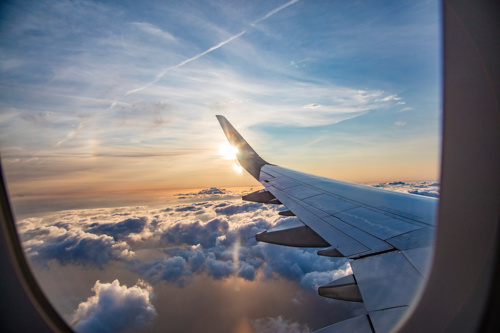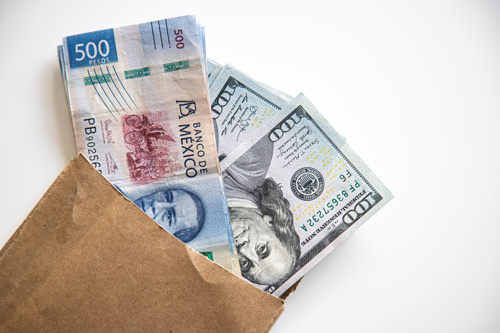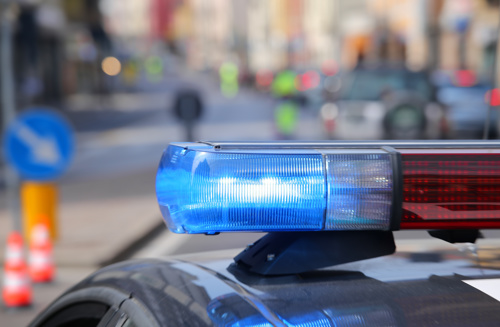Once you’ve arranged your travel plans and bought your Travel Money, thinking about the best way to carry money abroad might not be top of your to-do list.
But while it’s not quite as exciting as planning activities to do while you’re there, understanding how to keep money safe when travelling abroad will help you to avoid any unnecessary stress. So, we’ve covered everything you need to know about some of the best way to travel with money – both cash and card – and included some essential pre-travel checks to tick off before you go.
There’s also advice on how to avoid travel scams and theft, plus what to do in an emergency while you’re abroad. That way you can sit back, relax, and enjoy your trip knowing that your money is safe – and get back to planning that travel itinerary…
1. Start with pre-travel money preparation

You might be raring to go, but preparation is key to a stress-free trip. So before you pack your bags, it’s worth checking off some essential pre-holiday housekeeping:
Exchange enough cash
As well as having enough foreign money for day-to-day purchases, it’s a good idea to have some in case of an emergency. So, research your local currency – particularly average prices for things like meals and taxi fares – to work out how much foreign currency you actually need.
Get to know your destination
Knowing a little about the local currency will also help you to avoid falling for common scams – like being overcharged for a taxi ride at the airport, for example. You’ll also need to take note of any cash declaration laws. Some destinations, like Morocco, have specific limits.
Notify your bank
Multiple payments coming out of your account in a foreign currency can be flagged as suspicious activity by your bank. Always notify them when you’re due to travel, to prevent your card from being blocked – and the inconvenience of having to unblock it – while you’re away.
Check your bank’s contact numbers
While you’re on the phone to the bank, make sure you have the correct number to call them in an emergency should you need to. The number you need to call while you’re overseas may be different to the one you use at home.
Keep your currency exchange receipt
If you need to make a claim on your travel insurance, for example in the event of a theft, you’ll need to show receipts for your foreign currency. Check your policy carefully as you may also need receipts for other items in your suitcase, as well as photographs.
2. Decide if you’re taking cash, card or both
Both cash and card have their advantages when you’re travelling – and it’s generally advised to carry both. It’s always advisable to carry some of the local currency with you in cash, though, for reasons we’ve explored below.
The benefits of carrying cash
While places like restaurants and shops in big cities are all set up to take card payments, you’re likely to be met with blank looks if you wave your credit card around while shopping for souvenirs at a local market.
Likewise, carrying cash means you can try something delicious from a street food stall, or say yes to another ice cream at the beach.
Cash is also widely used for tipping, and allows you to keep an eye on your holiday spending by seeing at-a-glance what you’ve got left. Plus, having plenty of the local currency in cash means you won’t need to hunt for an ATM when you get to your destination – or potentially get charged bank or ATM fees for withdrawing cash abroad. There's more advice in our guide to travelling with cash.
The benefits of using credit, debit and pre-paid cards
While cash may be king when you’re away, carrying cards is an important back-up to have in the case of an emergency, should you need to make an unexpected large purchase.
With credit cards you’re protected for single purchases between £100 and £30,000 under the Consumer Credit Act. Just make sure you’re aware of non-sterling cash fees that may apply each time you use your card, as well as your interest rate.
3. Choose from some of the best ways to carry money abroad

Now you’ve exchanged your currency and got your cards ready as a back-up, consider how you’ll carry your money while you’re abroad. Taking an envelope full of foreign currency out of your bag every time you want to buy something can be risky when it comes to keeping your money safe. Instead, it’s a good idea to split your cash between several places:
Firstly, have a small amount close to hand ready to access for day-to-day purchases – in something like a money belt or a cross-body bag worn on your front. That’s for the spontaneous glass of Chianti from one of Florence’s wine windows, or the must-have Moroccan lantern in the souks of Marrakech.
Next, store a slightly larger amount of cash somewhere hidden away in your day bag. Your budget for one day is ideal. Make sure it’s not on show, and that this bag won’t be left unattended at any time. An anti-theft bag with additional security features is ideal for this, or a money belt worn under your clothes.
Lastly, it’s a good idea to store the rest of your cash in your hotel safe, if you have one. If not, split your cash between yourself and any other people you’re travelling with in a similar way. The idea is simply to avoid keeping all your cash in one place, which poses a bigger risk and would make life much more difficult if something were to happen to it.
4. Avoid common travel scams and theft
Although common sense plays a big part in carrying money safely abroad, it can be easy to unwittingly become a target for crime. So it’s worth being aware of common tourist scams in your destination, so you can watch out for them while you’re away.
One of the most commonly reported scams, for example, is taxi drivers overcharging tourists when picking up from the airport. That could mean taking an overly long route to inflate the fare, or simply hiking up the price of the journey – so it’s wise to get familiar with average prices before you go.
Other scams, like skimming – where criminals use a card reader to steal your bank card details at close range – are more sophisticated. If skimming is a known travel scam in your destination, you may want to consider investing in a wallet or money belt fitted with RFID blocking technology, which protects your cards from being read. The foreign travel advice page on GOV.UK is a handy reference point for country-specific information.
5. Know what to do if your money is lost or stolen

While it’s unlikely you’ll need to report your money as lost or stolen – particularly if you’ve followed the advice above – it’s still important to know how to if you’re faced with an emergency. Acting fast and following the right procedures means a better chance of being reconciled with your money, so always follow the steps below:
- Report lost or stolen money to the local police force immediately, giving them as much detail as possible.
- File a police report and request a copy, which you’ll need to provide to your travel insurer to make a claim.
- Inform your bank straight away if your card is lost or stolen, using an international contact number if there is one.
- Contact your travel insurer, who can advise on any additional information you may need to provide to them.
- If your passport is also missing, contact the closest embassy or consulate, who can also help you with emergency money options.
Remember, planning ahead and staying vigilant are the best ways to keep your money safe when you’re travelling abroad. Armed with this information, you can relax and enjoy your trip – wherever in the world you’re heading to.
Buying foreign currency with M&S Travel Money
Ready to go? Wherever you’re heading, you can order your currency online today for Click & Collect with no commission and no hidden fees. T&Cs apply.
